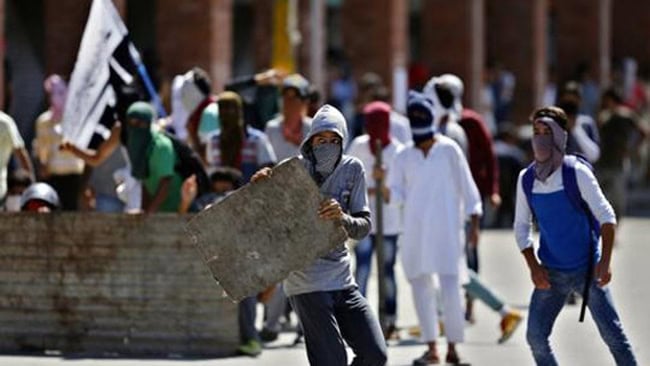Srinagar: J&K Chief Minister Mehbooba Mufti on November 29 ordered that the first-time cases of stone-pelting against 4,327 youths be withdrawn. The decision was taken to create “a positive and conciliatory atmosphere in the state.”
Since militant Burhan Wani was killed last year, there were wide spead protests in the valley against the armed forces. Stone pelting by the youth became a common scene.
Aamir, 17, his mother Mehnaz Akhtar said that “I agree, my son committed a mistake but he was just 17 then. He suffered a lot because of the case. I hope this amnesty will help him lead a normal life again.”
Aamir, whose father died when he was three years old, admits that he pelted stones “in fury… several times” after he was once “beaten by a policeman while watching a protest from the sidelines”. Today, he describes the amnesty, for which his name has been recommended, as “Godsend”.
“I was released from jail after 16 days but had to pay a heavy price. I was rusticated, couldn’t appear for the exams and lost a year of schooling. After completing Class 10, I applied for a passport so that I could look for a job abroad. But I could not clear the police verification because of the case.”
The committee which recommended the withdrawal of cases, also consisted of J&K DGP S P Vaid who said that “the number of people who will benefit is around 4,300”.
Shabir Ahmad Ganai, 23-year-old bus conductor in Baramulla was charged for pelting stones during protests in 2010. He said “That was the first and last time I was part of a stone-throwing protest. All these years, my focus was on the case, and I had to present myself in court every month. Now I have been told that the case will be withdrawn. If that happens, I can focus again on my work and family,”
Danish Qayoom from Bhagwanpura, runs a furnishing shop and says that stone pelting case against him was like “a sword hanging over the neck”.
He further added that “I have suffered a lot because of this case. I had to shut my shop every time I had to attend court hearings. If it is withdrawn, I will be able to live a normal life like others, it would be the biggest relief,” he says.
A 22-year-old college student also said that “I was charged in 2010, I was only 16 then. Those days, everyone was out on the streets throwing stones. After some months, I came to know that a case has been registered against me. My family knows that I was part of many protests, but they don’t know about the FIR. If the case is withdrawn, it will help me keep it a secret.”
The boy also added that “Nobody wants to pelt stones but sometimes the circumstances are so created (by security forces) that we are forced to pelt stones at them. I can’t be sure that I won’t pelt stones in the future. Sometimes, it happens at the spur of the moment.”

